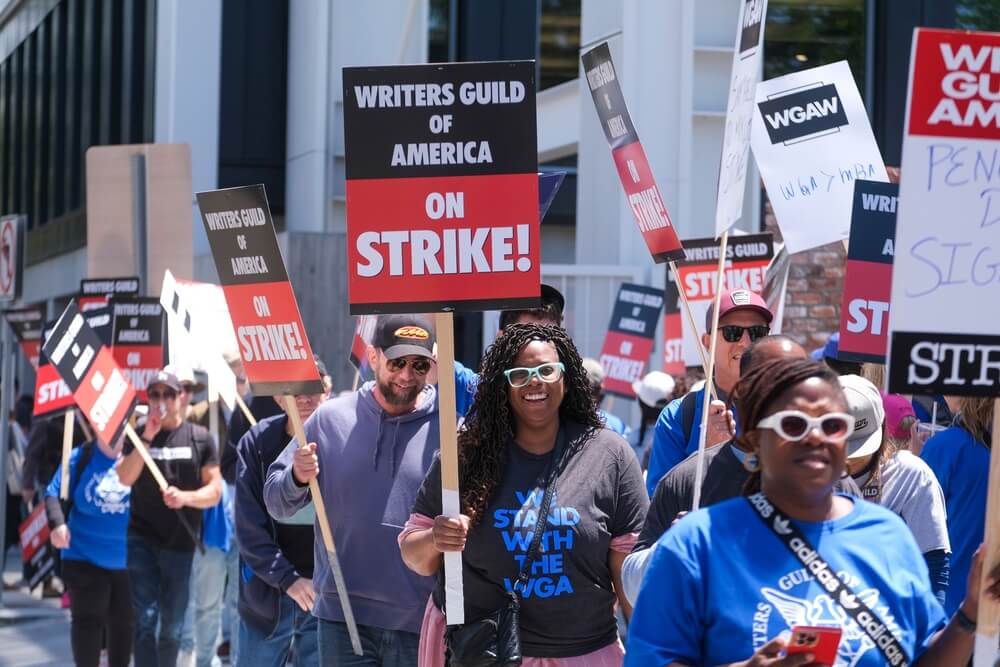Frequently Asked Questions About the Writers’ Strike
Since May 2, the Writers Guild of America (WGA) is currently on strike, with no signs of stopping any time soon. The 11,500-member union is seeking higher pay, residuals from streaming platforms, job security and regulation of the use of artificial intelligence (AI). This strike is important not just because it affects everyone in the entertainment industry, but because it has the potential to create ripple effects outside of show business.
At Casting Networks, we know you have questions, and we want to make sure that we’re taking the steps to inform and help the acting community during these tough times. Here are answers to some of those questions that actors may be asking:
How does the WGA Writers’ strike affect me as an actor?
If you are involved in a production that employs WGA writers and/or is a union production, you may experience a work stoppage until the dispute is resolved. If you are involved in non-union work or work in print, you may not experience any loss of work.
If you are a WGA writer-performer, then you must also follow the official WGA strike rules, which it sums up as “Writers cannot do any writing, revising, pitching or discussing future projects with companies that are members of the AMPTP (Alliance of Motion Picture and Television Producers, aka the organization with whom the WGA is trying to reach an agreement with).”
If you are able to and choose to perform, then as a WGA member you cannot do any writing on these projects, whether you are hired as a writer or not. If you are a member of both SAG-AFTRA and the WGA as both a writer and performer, you can only work as an actor.
What if I’ve been cast, but haven’t started on-set yet?
It depends on both the type of project being produced and the companies producing the project. If it is a scripted project then production may be halted, unless the production companies involved choose to continue.
Is there any support (financial/welfare/emotional) I can get?
If you are a WGA member, it depends on where you are. In California, employees on strike are normally not entitled to unemployment insurance benefits. In New York, employees eligible for unemployment are entitled to unemployment insurance benefits while on strike after a two-week waiting period.
Will it affect voiceover work?
It depends on the type of voiceover work and genre. Animations and some commercial or video game VO may be affected if they are union projects, but other genres such as corporate narration/eLearning and audiobooks may not be affected, as these are typically non-union and are written by individuals or copywriters/agencies working with a company.
How does this affect future work? For example, if it goes on for X amount of days, how long will that impact the industry?
More types of productions may be affected the longer the strike lasts. This can affect the actors involved in halted projects in a few ways, which may include the following:
- Availability:
- Casting for projects:
- Canceled projects:
- Delayed or canceled productions currently filming:
A delayed project could change your scheduled dates on some projects and may push back or create a conflict with other projects you had previously committed to. This can be especially true if you had/have several projects lined up back to back.
No script means no characters to play.
Some studios may not be able to shoulder the costs of delayed work, and could choose to scrap some or all future projects.
Some production workers may choose to stand in solidarity with striking writers, refusing to cross picket lines. This too could create delays for projects you may be working on that are currently filming. If enough production workers join the strike, it could lead to the project shutting down completely.
That said, TV will likely be more impacted than film (this is because most films already have their scripts). However, if you are working in TV, the severity of the strike’s impact depends on the state of your show’s scripts, the backlog of scripts on-hand and whether or not your production decides to show solidarity with striking writers by not crossing picket lines.
Shows that need new scripts daily, such as talk shows and variety sketch shows, were the first to shut down. Daytime soap operas could be affected in the coming weeks. Most streaming and network productions are written and filmed well in advance, and may not be affected unless the strike lasts into their production schedules for the next season. Films are the last productions to be affected as they are written and filmed well ahead of release. They are less likely to face delays unless the strike extends to titles set to release in 2024 and 2025.
How does it affect projects currently in production?
If a project is currently in production, then it is up to the companies producing the project to decide whether or not to continue production of a show.
What if I’m working internationally?
Again, it depends on the project and whether or not it is using WGA writers. Because the WGA is an American union, projects overseas may not experience delays or effects of the strike for now.
Are there any projects I might still be able to do?
Actors should still be able to work in print, non-union jobs, theater work for currently running productions and reality/unscripted productions. In a nutshell, you can likely still perform in just about anything non-union or not requiring newly written work that would lead a production.
If you have any additional questions regarding the strike and what type of work you may be able to do, take a look at the WGA strike rules, the WGA’s proposals and the SAG-AFTRA member statement.
Related articles:
- 3 Things Actors Should Do Now to Financially Survive the Writers’ Strike
- How You Can Support and Engage With Your Artistic Community
- Work Begets Work — The Power of Creating Your Own Projects




